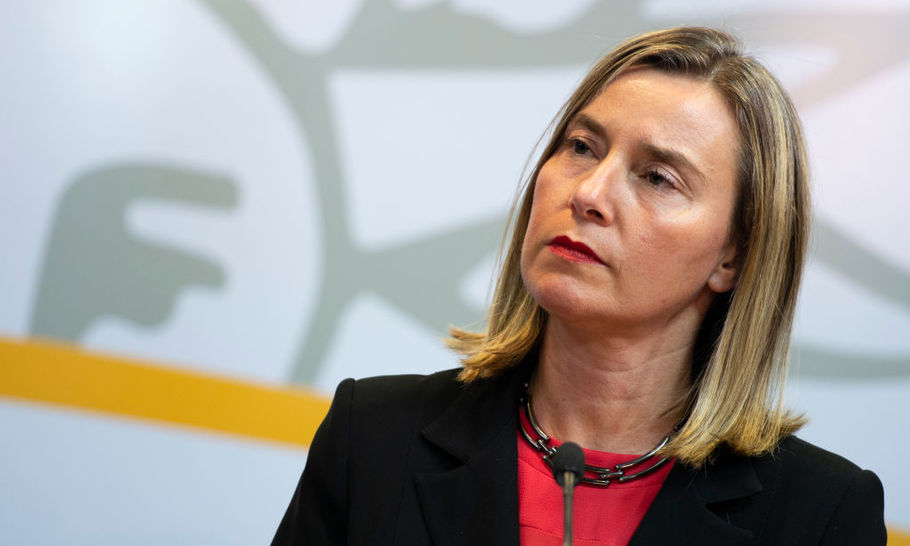How has the EU become a diplomatic bystander?

Santiago Mazzarovich/Getty Images
While the Brexit process winds its serpentine way towards some kind of resolution, the rest of the world is moving on. This week two rival summits took place in Warsaw and Sochi, convened by the US and Russia respectively. Remarkably, the European Union was absent from both.
Admittedly, no Western powers were invited to Sochi, where the future of Syria is being decided by the sinister trio of Presidents Putin, Erdogan and Rouhani. More surprising is the fact that even though Warsaw is a European Union capital, the EU was not represented there. The Foreign Secretary, Jeremy Hunt, turned up to shake hands with US Vice-President Mike Pence, the Israeli Prime Minister Binyamin Netanyahu and most of the Sunni Arab states, led by the Saudi foreign minister. France and Germany sent lower level officials.
But Frederica Mogherini, the High Representative of the European Union, refused to go to Warsaw. Did the EU’s most senior diplomat have more urgent business to keep her from attending? No: her absence was a deliberate snub to her American counterpart, the US Secretary of State Mike Pompeo, who announced the summit after a tour of seven Arab states last month.
It is a strange kind of diplomacy to ignore a conference in the heart of Europe organised by the EU’s major ally. But Ms Mogherini is a strange kind of diplomat. She doesn’t mind insulting the Poles, whom she is supposed to represent, but who are regarded in Brussels as pariahs. Far more important in her eyes are the Palestinians, who were not invited to Warsaw for the simple reason that they do not have a state. For that reason alone, the EU was always going to boycott what may nevertheless prove to have been the most significant gathering on European soil since the Iran deal was agreed in Vienna four years ago.
Ah yes: Iran. The purpose of the Warsaw summit is partly to isolate the Islamic Republic, which Israel and the Sunni Arabs agree poses a mortal threat to peace in their region. Why? Iran’s fomenting of civil war in Yemen and terrorism elsewhere, the presence of the Revolutionary Guard in Syria, its influence over Lebanon, Iraq and Gaza, and above all its continued pursuit of a nuclear programme despite its deal with the West: all this has caused Iran’s Arab enemies to overcome their differences and make common cause with Israel and the United States.
Yet as the tectonic plates are shifting in the Middle East, Europe is a bystander. It failed to prevent the Iran deal, which Donald Trump called “one of the worst and most one-sided transactions the United States has ever entered into”, from falling apart in 2017. The reimposition of US sanctions on Iran has split the EU, as Europeans are forced to choose between doing business with Tehran or with Washington.
Meanwhile, the EU has refused use the leverage provided by bankrolling the Palestinians to force them to enter serious negotiations with Israel. This has stalled the peace process and in effect made the Palestinians as irrelevant as the EU itself. Israel and the US are still talking about possible two-state solutions but there is no Palestinian interlocutor — another diplomatic disaster for the EU.
Such grand diplomacy seems a million miles from Westminster, locked in its grim game of brinkmanship with Brussels. But as MPs debate Brexit, they should not forget the world outside. The future of the world is being decided now, and it is not being decided by multinational organisations such as the United Nations or the European Union. The big decisions are being made by nation states, at gatherings organised and hosted by nation states. That is Realpolitik in 2019.
One of Europe’s greatest enthusiasts, George Soros, wrote this week that the European Union is “sleepwalking into oblivion”, as the Soviet bloc did 30 years ago. “The current [EU] leadership is reminiscent of the Politburo when the Soviet Union collapsed,” he writes. Soros may be 88, but his prophecies still carry weight. The EU should listen to its Jeremiah before it is too late.





